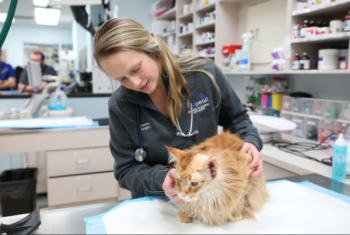March is Brain Injury Awareness Month.
From the battlefield to the playing field, brain injury has long been a signature wound for discussion among human healthcare professionals and the public. Much less discussed is the prevalence of brain injury among companion animals—primarily cats and dogs. While brain injuries can be devastating, and often are fatal in humans, these injuries can be just as debilitating for our four- and two-legged friends.
In honor of Brain Injury Awareness Month (March), Dr. Daniel Hicks, veterinary neurologist at BluePearl Specialty and Emergency Pet Hospital, shares causes, symptoms, and what to do next if you think your dog or cat may have a brain injury.
Brain injury occurs when there is damage to brain cells from trauma or brain disease, such as stroke, tumor, or inflammation. Brain damage can also occur from metabolic dysfunction, which is when the metabolism process fails and the body produces too little or too much of the substances it needs to remain healthy,” explained Dr. Hicks. “Traumatic brain injury, however, is specific to injury caused by a force or blow to the head, such as in a car accident or falling from a high height. Severity of symptoms and recovery from injury ultimately depends on the degree of damage.”
While there may not be any obvious symptoms in pets with mild brain injury, Dr. Hicks says pets that have experienced more severe brain injury can develop a myriad of neurologic abnormalities.
Common symptoms include:
- Lethargy
- Reduced consciousness
- A dazed or disoriented appearance
- Paralysis of one or more limbs
- Abnormal or different sized pupils
- Vision deficits or blindness
- Seizures
- Circling, pacing, head pressing or other manic behavior
- Abnormal respiratory patterns, such as heavy or rapid breathing
- Abnormal heart rate or rhythm
For dogs or cats with traumatic brain injury, there may be physical signs of trauma including skin wounds, bleeding inside the eye (ocular hemorrhage), or bleeding from the ears or nose.
Common Causes of Brain Injury in Pets
There are many ways dogs and cats can sustain brain injuries. Common causes of brain injury in pets include being hit by a vehicle, attacks by larger animals (e.g. being severely shaken and/or bitten), falling from a high height, blunt force trauma, or gunshot wounds. Other common causes to brain injuries include:
- Hypothermia or hyperthermia
- Chronic and/or prolonged seizures
- Unusually low blood glucose (hypoglycemia)
- Infections of the nervous system
- Immune-mediated diseases
- High blood pressure
- Brain parasites
- Brain tumors
- Toxicity
Diagnosis & Treatment
Diagnosis of brain injury is often based on a combination of tests and/or exams, including a clinical examination, neurological testing, and historical overview of the pet’s health. A veterinary neurologist will first evaluate and stabilize (if necessary) your pet’s breathing and cardiovascular function. Once the pet is stabilized, they will then perform a neurological exam, which often includes a form of neuroimaging, such as Magnetic Resonance Imaging (MRI).
Today, MRIs can be used on dogs, cats, horses, bald eagles, sheep, and even ferrets to obtain a quick diagnosis and treatment plan. MRIs screen for cerebral bleeding or underlying brain disease, which are indiscernible with a CT scan.
Once the pet has been diagnosed, the veterinarian will then suggest a treatment plan. Treatment may include intravenous fluids (to treat shock and stabilize blood pressure), wound management, oxygen support, and/or medication to help control swelling, decrease intracranial pressure, treat infection, or to address pain, nausea or seizures.
Recovery
Fortunately, pets can recover after sustaining brain injury. While pets can have long-term neurological issues that may require chronic use of medications and physical therapy, younger pets or pets who have had a less severe injury often have a good chance of making a full recovery.
Pets are remarkably resilient to brain injury and many times can overcome even the most severe neurological symptoms,” said Dr. Hicks. “In pets with more severe injuries, who are significantly older or who have multiple pre-existing medical problems, recovery is less certain. Long lasting symptoms of more severe injury could include altered cognitive function, discoordination of one or more limbs, vision deficits, and seizures. Most of these symptoms, however, can be effectively managed, allowing these pets to live high-quality lives.”
If you witnessed your pet undergo trauma or suspect that your pet could have brain injury, immediately bring them in to see a veterinarian. If left untreated or undertreated, Dr. Hicks says brain injury can progress, leading to permanent damage or even death. BluePearl Pet Hospitals offer emergency and specialty veterinary care like neurology at many of our locations across the country. Find a BluePearl neurologist near you.


